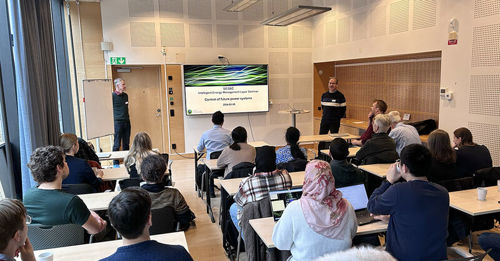Control of future power systems

This was the first physical seminar focusing on Intelligent energy management.
We thank all the speakers and participants for great discussions!
Tomas McKelvey initiated the discussion by introducing Intelligent Energy Management (IEM) and providing updates on ongoing projects. IEM is one of three research layers within the centre. The core activities are directed towards a holistic analysis, coordination and control of generation, storage and end-use units connected to the electric power systems.
Torsten Wik, from the Electrical Engineering department at Chalmers discussed grid storage and the use of second-life batteries. Second-life batteries can last for many years, maybe up to decades. Recycling old batteries can, not only reduce waste, but also costs for EV owners. Torsten also highlighted the challenges posed by increased wind energy, such as inherent power variations and less inertia and talked about how Battery Energy Storage Systems (BESS) is a possibility for frequency control.
Daniel Karlsson, DNV (Det Norske Veritas) talked about the role of Phasor Measurement Units (PMUs) in future power grids, focusing on the measurement principle and synchronization methods. He highlighted the significance of PMUs in detecting and mitigating power system phenomena, citing the Hagby incident as an example.
Emil Andersson, strategic manager at Göteborg Energi, discussed the implementation and practical use of batteries in distribution systems, addressing uncertainties related to economics, climate, and security. Large industrial needs are causing capacity challenges. Emil also talked about the role of batteries in relation as a solution to manage peaks on for example cold winter days that are expecting to increase the coming years. Over-voltage issues are also to be considered due to the increase in solar power.
Arne Berlin, Vattenfall Eldistribution Arne shared insights into Vattenfall's work on proof of concept for battery storage in grids, with a particular focus on projects in Uppsala.
Md Tanbhir Hoq, Hitachi Energy Md Tanbhir discussed challenges and trends in power systems protection, highlighting the importance of adapting protection mechanisms to evolving grid configurations.
Marina Papatriantafilou, from the department of computers science engineering at Chalmers Marina, concluded the seminar with her perspective on data-driven support in energy and electricity systems.
Overall, the seminar provided valuable insights into the future of power systems and the role of intelligent energy management in addressing emerging challenges and opportunities.